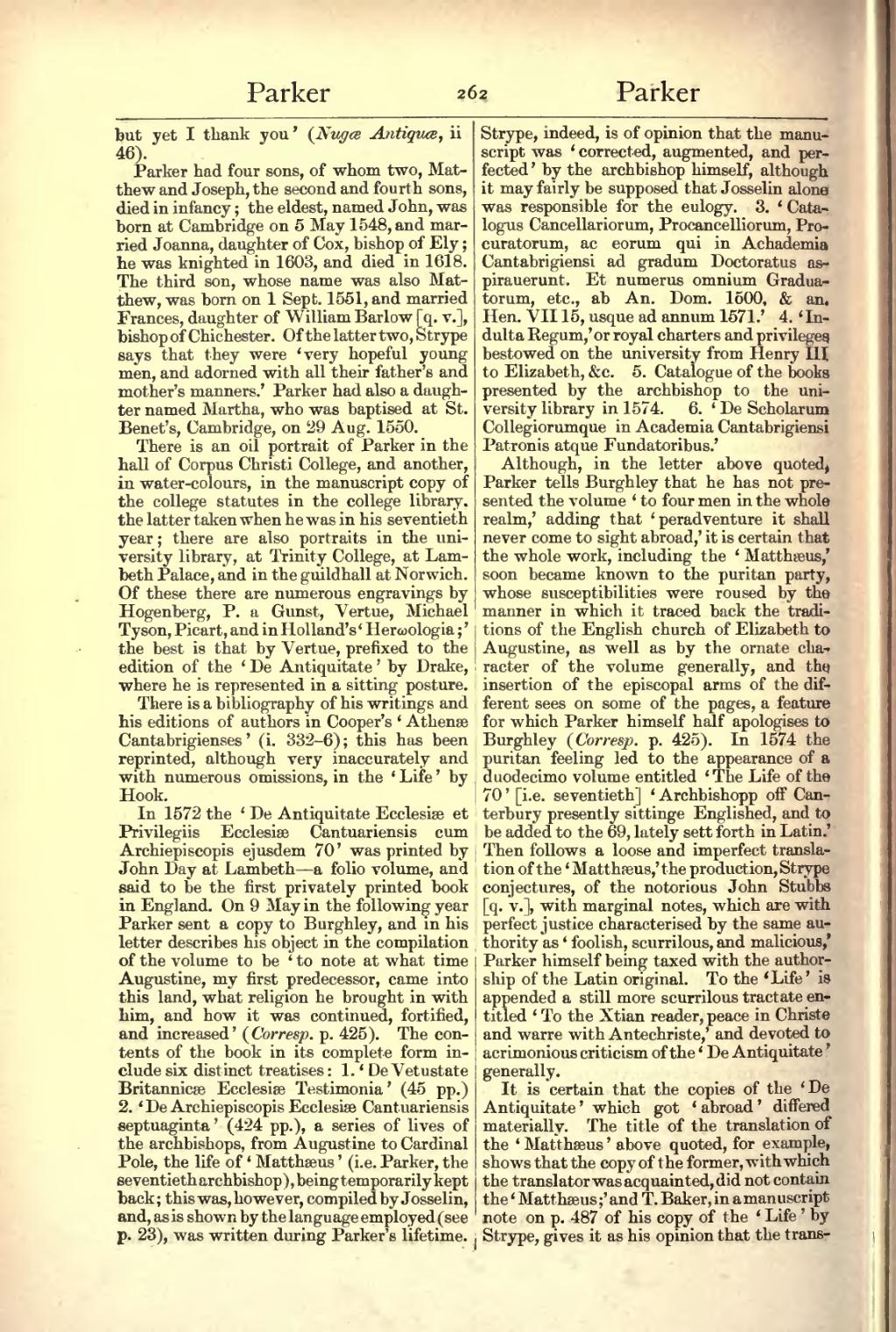Parker but yet I thank you' (Nugæ Antiguæ, ii 46).
Parker had four sons, of whom two, Matthew and Joseph, the second and fourth sons, died in infancy; the eldest, named John, was born at Cambridge on 5 May 1548, and married Joanna, daughter of Cox, bishop of Ely; he was knighted in 1603, and died in 1618. The third son, whose name was also Matthew, was born on 1 Sept. 1551, and married Frances, daughter of William Barlow [q. v.], bishop of Chichester. Of the latter two, Strype says that they were 'very hopeful young men, and adorned with all their father's and mother's manners.' Parker had also a daughter named Martha, who was baptised at St. Benet's, Cambridge, on 29 Aug. 1550.
There is an oil portrait of Parker in the hall of Corpus Christi College, and another, in water-colours, in the manuscript copy of the college statutes in the college library, the latter taken when he was in his seventieth year; there are also portraits in the university library, at Trinity College, at Lambeth Palace, and in the guildhall at Norwich. Of these there are numerous engravings by Hogenberg, P. a Gunst, Vertue, Michael Tyson, Picart, and in Holland's' Herωologia;' the best is that by Vertue, prefixed to the edition of the 'De Antiquitate' by Drake, where he is represented in a sitting posture.
There is a bibliography of his writings and his editions of authors in Cooper's ' Athenæ Cantabrigienses' (i. 332-6); this has been reprinted, although very inaccurately and with numerous omissions, in the 'Life' by Hook.
In 1572 the 'De Antiquitate Ecclesiæ et Privilegiis Ecclesiæ Cantuariensis cum Archiepiscopis ejusdem 70' was printed by John Day at Lambeth—a folio volume, and said to be the first privately printed book in England. On 9 May in the following year Parker sent a copy to Burghley, and in his letter describes his object in the compilation of the volume to be 'to note at what time Augustine, my first predecessor, came into this land, what religion he brought in with him, and how it was continued, fortified, and increased' (Corresp. p. 425). The contents of the book in its complete form include six distinct treatises: 1.' De Vetustate Britannicæ Ecclesiæ Testimonia' (45 pp.) 2. 'De Archiepiscopis Ecclesiæ Cantuariensis septuaginta' (424 pp.), a series of lives of the archbishops, from Augustine to Cardinal Pole, the life of 'Matthæus' (i.e. Parker, the seventieth archbishop), being temporarily kept back; this was, however, compiled by Josselin, and, as is shown by the language employed (see p. 23), was written during Parker's lifetime. Strype, indeed, is of opinion that the manuscript was 'corrected, augmented, and perfected' by the archbishop himself, although, it may fairly be supposed that Josselin alone was responsible for the eulogy. 3. 'Catalogus Cancellariorum, Procancelliorum, Procuratorum, ac eorum qui in Achademia Cantabrigiensi ad gradum Doctoratus aspirauerunt. Et numerus omnium Graduatorum, etc., ab An. Dom. 1500, & an. Hen. VII 15, usque ad annum 1571.' 4. 'Indulta Regum,' or royal charters and privileges bestowed on the universitv from Henry III to Elizabeth, &c. 5. Catalogue of the books presented by the archbishop to the university library in 1574. 6. 'De Scholarum Collegiorumque in Academia Cantabrigiensi Patronis atque Fundatoribus.'
Although, in the letter above quoted, Parker tells Burghley that he has not presented the volume 'to four men in the whole realm,' adding that 'peradventure it shall never come to sight abroad,' it is certain that the whole work, including the 'Matthæus,' soon became known to the puritan party, whose susceptibilities were roused by the manner in which it traced back the traditions of the English church of Elizabeth to Augustine, as well as by the ornate character of the volume generally, and the insertion of the episcopal arms of the different sees on some of the pages, a feature for which Parker himself half apologises to Burghley (Corresp. p. 425). In 1574 the puritan feeling led to the appearance of a duodecimo volume entitled 'The Life of the 70' [i.e. seventieth] 'Archbishopp off Canterbury presently sittinge Englished, and to be added to the 69, lately sett forth in Latin.' Then follows a loose and imperfect translation of the' Matthæus,' the production, Strype conjectures, of the notorious John Stubbs [q. v.], with marginal notes, which are with perfect justice characterised by the same authority as 'foolish, scurrilous, and malicious,' Parker himself being taxed with the authorship of the Latin original. To the 'Life' is appended a still more scurrilous tractate entitled 'To the Xtian reader, peace in Christe and warre with Antechriste,' and devoted to acrimonious criticism of the 'De Antiquitate' generally.
It is certain that the copies of the 'De Antiquitate' which got 'abroad' differed materially. The title of the translation of the 'Matthæus' above quoted, for example, shows that the copy of the former, with which the translator was acquainted, did not contain the 'Matthæus' and T. Baker, in a manuscript note on p. 487 of his copy of the 'Life' by Strype, gives it as his opinion that the trans-
